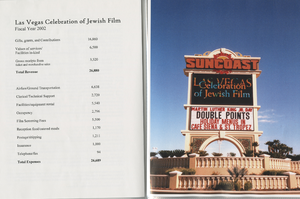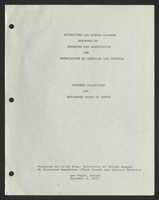Search the Special Collections and Archives Portal
Search Results

Laura Gentry interview, February 26, 1977: transcript
Date
Archival Collection
Description
On February 26, 1977, collector Harold May interviewed Laura Gentry (born May 1897 in St. Thomas, Nevada) at her cabin in Gold Butte, Nevada. In this interview, Laura Gentry discusses living in St. Thomas and Overton, Nevada. She discusses the development of the Overton and Gold Butte areas of Nevada as well as the people involved in mining in these areas.
Text

Transcript of interview with Russell K. Grater by James M. Greene, November 25, 1974
Date
Archival Collection
Description
On November 25, 1974, collector James M. Greene interviewed Russell K. Grater (born November 16th, 1907 in Lebanon, Indiana) in his home in Boulder City, Nevada. This interview offers an overview of the United States Park Service. Mr. Grater also offers an overview on the history of housing developments in the Las Vegas Valley and Nelson Township. The interview concludes with discussion on the leaf system of local plants.
Text

Transcript of interview with William Hanson by Randy Martin, March 5, 1979
Date
Archival Collection
Description
On March 5, 1979, Randy Martin interviewed William George Hanson (born 1937 in Huntington Park, California) in his home at 4506 West Del Oro Drive, Las Vegas, Nevada. The interview begins with Hanson providing a brief overview of the different addresses that he has lived at as well as his personal background and interests. Hanson describes his experience playing on a racially integrated youth baseball team and his perception of the western side of Las Vegas; Hanson later recalls a rumor he had overheard about Howard Hughes. The two then discuss recreation in Las Vegas; specifically, jazz entertainers that would perform at lounges on the Strip, and swimming in hotel pools. The interview concludes with Mr. Hanson describing a pizzeria that he used to frequent in the 1950s.
Text

Interview with Byron Leo Ristvet, April 17, 2006
Date
Archival Collection
Description
Text

Interview with James Nobuo Yamazaki, October 14, 2005
Date
Archival Collection
Description
Text

Interview with Layton James O'Neill, July 23, 2004
Date
Archival Collection
Description
Text

Las Vegas Celebration of Jewish Film scrapbook of brochures and pamphlets, 2002-2003
Date
Archival Collection
Description
Various brochures and pamphlets for the Las Vegas Celebration of Jewish Film.
Text

Interview with Julia Occhiogrosso, June 17, 2004
Date
Archival Collection
Description
Text

Accredited Law School Library Minimum Collection and Estimated Start Up Costs report
Date
Archival Collection
Description
Folder contains a report titled "Accredited Law School Library Approved by American Bar Association and Association of American Law Schools: Minimum Collection and Estimated Start Up Costs" prepared for Lilly Fong, University of Nevada Regent, By Katherine Henderson, Clark County Law Library Director. From the University of Nevada, Las Vegas William S. Boyd School of Law Records (UA-00048).
Text
Pittman Family Photographs
Identifier
Abstract
The Pittman Family Photographs depict members of the Pittman and Brewington families in Nevada from 1922 to 1989. The photographs primarily depict Nevada Governor Vail Pittman and his wife Ida Louise “Liz” Brewington Pittman at political campaign and fundraising events, including the Helldorado Parade in Las Vegas, Nevada and at the Governor’s Mansion in Carson City, Nevada. The photographs also depict Governor Pittman with President Harry S. Truman, Jim Cashman, and family members. The photographs also include a group photograph of U.S. Senator Key Pittman with business executives representing the Union Pacific Railroad and the San Pedro Railroad. Lastly, the collection also contains family photographs of Ann Brewington, Ida Brewington Pittman's sister.
Archival Collection
